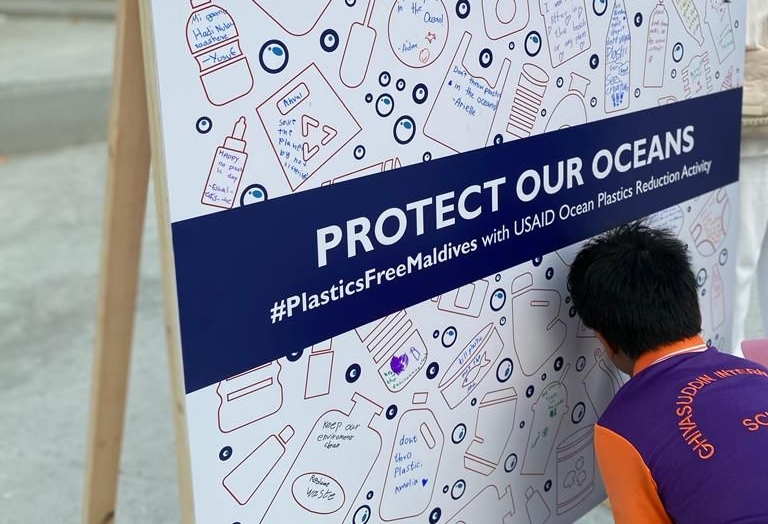Picture a garbage truck filled with plastic – bags, water bottles, food containers, soap bottles – the items of our everyday lives. Now, picture that garbage truck backing up to a beach and dumping its entire load into the ocean. A minute later, another truck. And another. Every minute. All day. Every day.
That is an estimated 8-12 million metric tons globally over a year, the amount of plastic pollution entering the world’s oceans in the same time frame. For perspective, it is estimated that by 2025 there will be a ton of plastic in the ocean for every three tons of fish and – if nothing changes – by 2050 there will be more plastic in the ocean than fish.
Today is World Oceans Day, and since 1992, the day has created a moment for governments, civil society, academia, and private sectors to recommit to protecting earth’s most valuable natural resource. This year’s theme is “Planet Ocean: Tides are Changing,” which speaks to hope for a crisis with profound consequences if unresolved.
The United States Agency for International Development (USAID) has a strong partnership with Maldives that includes working together to address ocean plastics and the effects of climate change. It’s part of my job as USAID’s mission director to ensure we continue the work because public health, economic prosperity, and biodiversity are at significant risk if we don’t address the issue.
However, to solve the problem, we need to first address why the threat is intensifying.
Today, 50 percent of plastics are single use, such as water bottles, straws, and take-away food containers. Globally, the main sources of ocean plastic pollution are land-based, stemming from urban centers with inadequate waste collection, disposal, and management. Simply put, the exponential growth of plastics use has far outpaced the infrastructure needed to manage it.
Fortunately, the ocean plastics crisis is solvable. In March 2022, United Nation member states endorsed the UN Treaty to End Plastic Pollution, which addresses plastic lifecycle issues by promoting sustainable production and consumption, representing a shift in focus from post-consumption practices to holistic systems. This growing momentum for a systematic approach to the problem creates mandates for all in the plastic waste value chain.
And, that is the key. The problem must be tackled from all directions. Individuals can reduce plastic pollution through reducing their use of single-use plastics and proper recycling. Industry can reduce plastics through reuse, refill models, and improved product recyclability. Governments can enact and enforce policies that encourage product recovery from industry at national levels and solid waste management, citizen engagement, and social safeguards at local levels.
Maldives has taken several steps to address its solid waste issues, including launching the Greater Male’ Waste to Energy Project in 2021, the largest integrated waste management initiative in the country. USAID supports Maldives in tackling the ocean plastics crisis through our five-year climate strategy with programs that work to reduce plastic and improve solid waste management to keep plastic out of the ocean.
Tides are indeed changing. As Maldives shows, increasing public awareness coupled with plastic reduction commitments from government and private actors are converging around positive, systems-led actions to address the ocean plastic crisis.
Doomsday scenarios for the world’s oceans do not have to play out as long as all parties take constructive action to stop them. Studies show we can reduce 80 percent of annual plastic leakages by strengthening policies and regulations, investing in infrastructure, and adopting changes that offer social, economic, and environmental benefits.
The plastic we produce and consume is our collective responsibility to manage. This World Oceans Day, let’s stem the tide of plastic pollution by all practicing the “3Rs” – Reducing plastic use, Reusing plastics when possible, and Recycling when we’re done. The health of our oceans, and planet, depends on it.
For more information on solid waste management in Maldives, visit the Maldives Ministry of Environment, Climate Change and Technology website http://www.environment.gov.mv/v2/en/.





